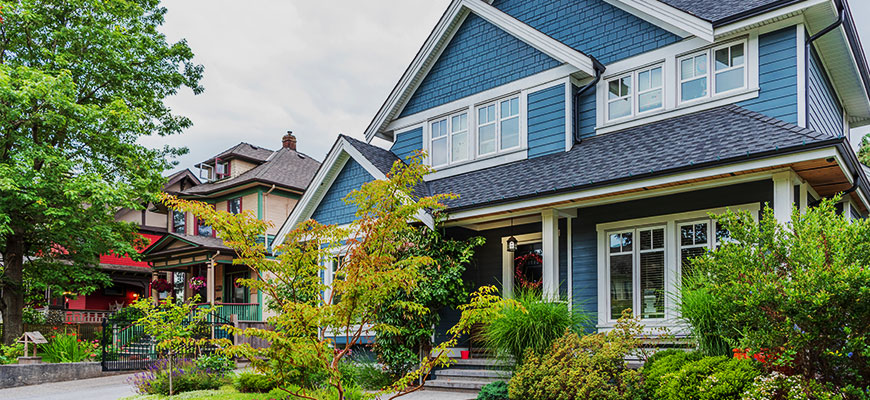Buying a house can be an expensive decision but did you know that you can qualify for incentives and rebates if you are a first-time home buyer in Canada?
Romana King
Jul 27, 2021
Learn More
Aug 05, 2021 • 8 min read
The housing market in Canada has heated up considerably over the past year - even more so than in previous years: national home sales rose throughout the second half of 2020 and reached an all-time record in March 2021. In June 2021, the national average home sale price increased by a whopping 25.9% year-over-year, according to Canadian Real Estate Board's monthly housing report.
Rising home prices in both large cities and smaller suburbs are impacting home ownership trends in Canada. With both the federal government and opposition leaders announcing plans to provide more affordable housing options across the country, homeownership and affordability continue to be hot-button topics in Canada, especially for Millennials (25 to 40 year olds) who are aspiring to buy homes.
To see what home ownership trends may exist in Canada, Borrowell, a fintech company that offers free credit report monitoring, analyzed over 713,000 credit reports of its members to understand how the average number of mortgages per consumer (an indication of home ownership, especially for younger buyers who have not yet paid off their mortgage) vary across age groups and cities. The 713,000 credit reports were of members who had credit scores of 600 and above, the minimum credit score required by the Canadian Mortgage and Housing Corporation (CMHC) for mortgage loan insurance, so that figures were a reflection of those who could potentially qualify for a mortgage based on their credit score.
According to the data, on average, 1 in every 3 consumers who had a credit score of 600 or above has a mortgage on their credit report. That said, this varies notably by city and age group, with Toronto having the lowest home ownership rates amongst older Millennials at 25% and Prairie cities like Edmonton and Calgary having the highest home ownership rates amongst older Millennials at 39%. The infographic below shows average home prices and the average number of mortgages per consumer for 15 major cities in Canada, by five age groups.
Note: while the presence of a mortgage likely indicates homeownership, mortgage trades will not be on a credit report if a consumer has paid off their home; for example, consumers in older age groups may have lower rates of mortgages but higher rates of ownership as they pay off their mortgages. Home owners who don’t have a mortgage are not included in this study’s data set nor those who may own properties through a business entity.
Credit reports were pulled from Equifax Canada. Average home prices were pulled from national and local real estate associations, such as the Canadian Real Estate Association (CREA).
Based on over 713,000 credit reports from consumers with a credit score of 600+:
Toronto has the lowest rate of home ownership (0.22 average mortgage trades per consumer), and the second highest average home price among cities in the study
Regina has the highest rate of home ownership, roughly 1.7x more than Toronto (0.38 average mortgage trades per consumer vs. 0.22), along with the lowest average home price among cities in the study
Toronto and Vancouver have the lowest rates of home ownership amongst older Millennials aged 30-39 (0.24 average mortgage trades per consumer)
Edmonton and Calgary have the highest rates of home ownership amongst older Millennials, roughly 1.6x more than Toronto and Vancouver (0.39 average mortgage trades per consumer vs. 0.24)
Middle-aged Canadians who are 40-59 years old are 1.4x more likely to have a mortgage than older Millennials who are 30-39 years old (0.50 average mortgage trades per consumer vs. 0.35)
Middle-aged Canadians are 5x more likely to have a mortgage than younger Millennials and Gen Z consumers aged 20-29 years old (0.50 average mortgage trades per consumer vs. 0.10)
For Millennials and Gen Z consumers aspiring to be homeowners, they may be encouraged to know that the likelihood of having a mortgage seems to increase as they get older: middle-aged Canadians (40-59 year olds) are 1.4x more likely to own homes than older Millennials (30-39 year olds), and they are over 5x more likely to own homes than younger Millennials and older Gen Z Canadians (20-29 year olds).
One out of two consumers who are 40-59 years old have a mortgage, while about 1 out of 3 consumers who are 30-39 years old have a mortgage and only 1 out 10 aged 20-29 have a mortgage.
According to the report findings, cities with higher home prices generally have lower ownership rates. Regina, with the lowest average home price of $267,800, has the highest average number of mortgages per consumer. This is roughly 1.7x more than Toronto, which has the lowest rate of home ownership at 0.22 average mortgage trades per consumer and the second highest average home price of $1,075,636.
This trend in home ownership versus price is also noticeable when looking at the home ownership rates of older Millennials aged 30-39. The top two cities with the highest home ownership rates amongst older Millennials are Edmonton and Calgary, with 0.39 average mortgage trades per consumer. Edmonton’s average home price is $398,229 and Calgary’s average home price is $458,300, both below Canada’s average home price of $734,500.
In comparison, the top two cities with the lowest home ownership rates amongst older Millennials are Toronto and Vancouver, with 0.24 average mortgage trades per consumer. Vancouver and Toronto average home prices are the two highest among the cities in this study and over 2.7x the average price of Edmonton homes. The relative affordability of homes may be a main driver of why older Millennial home ownership rates in Edmonton and Calgary are over 1.6x higher than home ownership rates in Toronto and Vancouver.
High home prices in cities like Toronto and Vancouver and market conditions in certain cities may be preventing consumers from entering the housing market. Toronto, Vancouver, and Montreal have seen year-over-year housing price increases of 17.0%, 14.5%, and 27.4%, respectively. However, surges in housing prices have not been limited to larger cities in Canada. Smaller cities like Hamilton, Halifax, and Winnipeg have also seen year-over-year housing price increases of 27.7%, 27.6%, and 15.0%, respectively. This upward trend across the board shines a spotlight on home ownership and affordability issues in Canada, especially for the country’s younger populations.
“The pandemic has activated homebuyers across the country in large metropolitans and smaller suburbs, which has led to considerable demand and housing price increases across the board,” says Andrew Graham, co-founder and CEO of Borrowell.
“Since the pandemic started, many more Canadians have sought out homes with larger square footage and green space, often in smaller towns and cities. With more Canadians than usual setting their eyes on the suburbs, local buyers and Millennials looking for their first home have faced more competition, especially as real estate prices continue rising. You can see that Millennials in certain cities are facing bigger hurdles than ever before when it comes to purchasing a home, even if they have a good credit score.”
Cities with Highest Average Mortgage Trades per Consumer
Regina: 0.38 (home price: $267,800)
Calgary: 0.37 (home price: $458,300)
Edmonton: 0.36 (home price: $398,229)
Surrey: 0.35 (home price: $1,061,700)
Winnipeg: 0.34 (home price: $324,900)
Cities with Lowest Average Mortgage Trades per Consumer
Toronto: 0.22 (home price: $1,075,636)
Halifax: 0.23 (home price: $468,790)
Vancouver: 0.24 (home price: $1,290,250)
Hamilton: 0.26 (home price: $787,758)
Montreal: 0.26 (home price: $498,900)
Cities with highest rates of home ownership for ages 20-29
Regina: 0.15 (home price: $267,800)
Edmonton: 0.12 (home price: $398,229)
Calgary: 0.11 (home price: $458,300)
Winnipeg: 0.11 (home price: $324,900)
Saskatoon: 0.11 (home price: $364,637)
Cities with lowest rates of home ownership for ages 20-29
Hamilton: 0.07 (home price: $787,758)
Vancouver: 0.07 (home price: $1,290,250)
Toronto: 0.07 (home price: $1,075,636)
Victoria: 0.08 (home price: $829,600)
Montreal: 0.08 (home price: $498,900)
Cities with highest rates of home ownership for ages 30-39
Edmonton: 0.39 (home price: $398,229)
Calgary: 0.39 (home price: $458,300)
Surrey: 0.38 (home price: $1,061,700)
Winnipeg: 0.37 (home price: $324,900)
Regina: 0.37 (home price: $267,800)
Cities with lowest rates of home ownership for ages 30-39
Toronto: 0.24 (home price: $1,075,636)
Vancouver: 0.24 (home price: $1,290,250)
Halifax: 0.25 (home price: $468,790)
Burnaby: 0.28 (home price: $1,074,167)
Montreal: 0.29 (home price: $498,900)
Report findings are based on historical credit report data of over 713,000 Borrowell members in Canada for Q2 2021 (April to June 2021) who have credit scores of 600 and above. Findings may not represent the entire population. Credit reports of Borrowell members are provided by Equifax Canada. Cities are based on the location in members’ profiles.
Mortgage trades are mortgages listed as credit accounts on credit reports. The average number of mortgage trades is calculated by adding the number of mortgage trades listed on credit reports and dividing the sum by the total number of credit reports. Canadians who fully own their homes or who own properties through business entities who do not have an active mortgage listed on their credit report are not included in this study’s data set.
Average home price data for June 2021 was sourced from national and local real estate associations and boards, such as the Canadian Real Estate Association (CREA).
For media inquiries and interviews, please contact [email protected]
Trusted by over 3 million Canadians, Borrowell provides free weekly credit scores and report monitoring, personalized financial product recommendations and affordable tools to help you build your credit. Sign up for your free Borrowell account today on borrowell.com, or download the mobile app for Android or iOS.
Buying a house can be an expensive decision but did you know that you can qualify for incentives and rebates if you are a first-time home buyer in Canada?
Romana King
Jul 27, 2021
Learn More
A credit score of 680 or above is required to qualify for the best mortgage rates in Canada in 2026.
Sean Cooper
Nov 12, 2025
Learn More
If you’re looking at buying your first home, and not sure where to start, you're not alone. Most people consider buying a home an extremely daunting prospect.
Properly
May 28, 2020
Learn More


